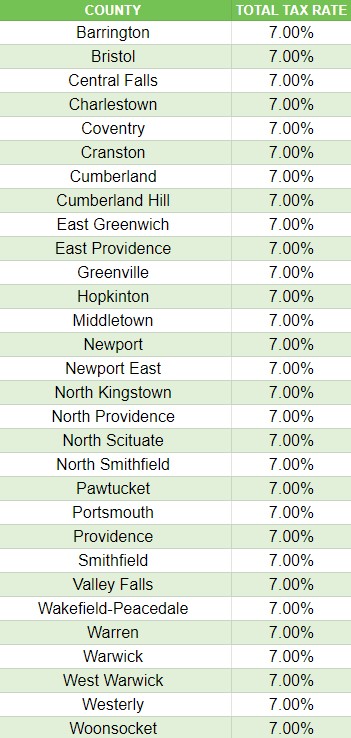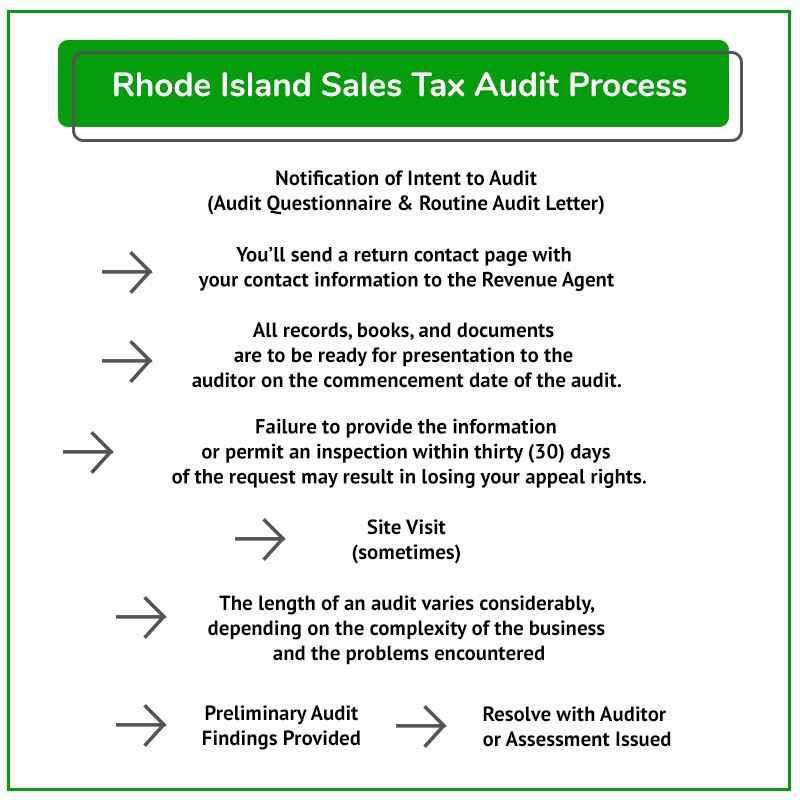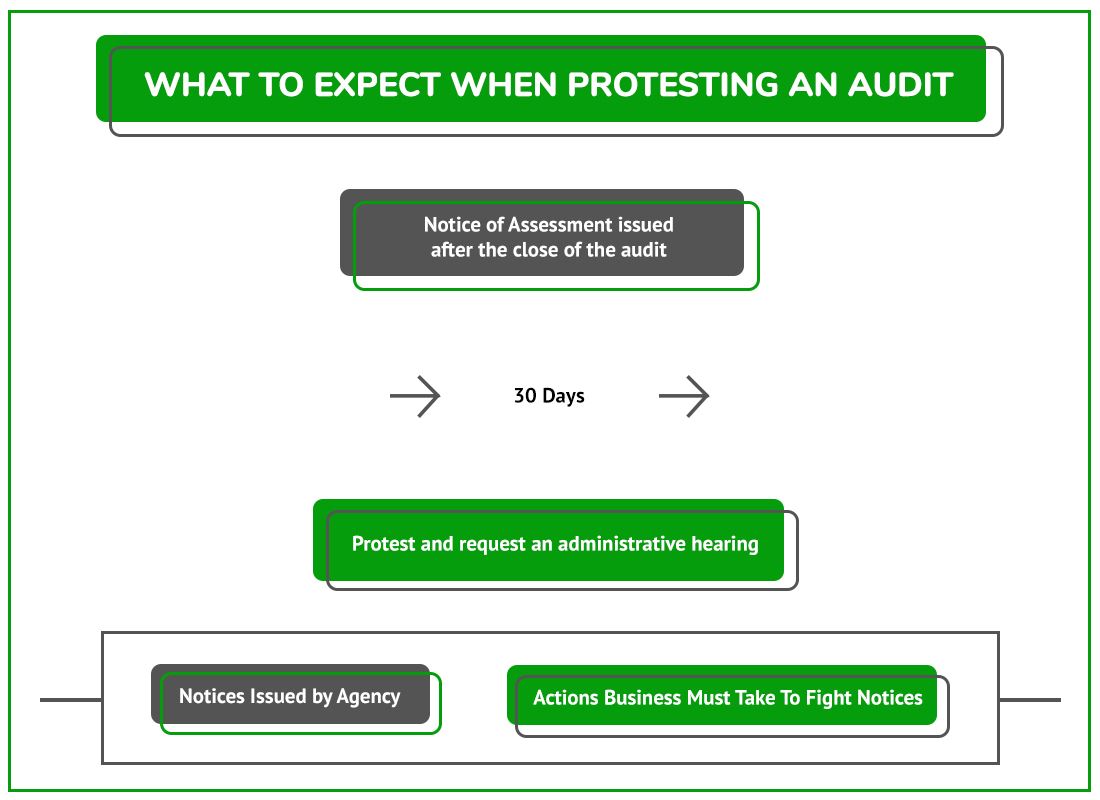
Rhode Island Sales Tax & Audit Guide
Straightforward Answers to Your Rhode Island Sales Tax Questions.
- Do I need to collect Rhode Island Sales tax?
- Should I be collecting or paying Rhode Island Use tax?
- What do I do if I should have been collecting but haven't?
- I received an audit notice. What should I do?
- Guidance on fighting a sales tax assessment in Rhode Island.
Who Needs to Collect Rhode Island Sales and Use Tax?
A business selling, renting, or leasing tangible personal property at retail must collect the sales tax.
Any vendor with a business location in Rhode Island or leases tangible personal property is required to collect and remit Rhode Island sales and use tax. Other business activities may also require an out-of-state vendor to collect the Rhode Island sales/use tax.
How is Nexus Established in Rhode Island?
Nexus is a sufficient connection between a person or business and a state and an adequate relationship between a businesses activity, property, or transaction and a state that allows the state to subject the business and the activity, property, or transaction to its taxing jurisdiction.
For sales tax purposes, nexus is determined when the taxpayer has a physical presence in the state.
However, out-of-state retailers and remote sellers with no physical presence in Rhode Island may have nexus if they meet the economic thresholds noted in the next section.
Economic Nexus (Wayfair Law) and Internet Sales in Rhode Island
In Rhode Island, remote sellers with
- gross receipts of one hundred dollars ($100,000) or greater, or
- two hundred (200) transactions or greater
in the previous or current calendar year have economic nexus with Rhode Island and are responsible for obtaining a retail license and remitting Rhode Island Sales and Use Tax.
How is the $100,000 gross revenue threshold calculated?
The $100,000 economic nexus for a remote seller includes:
The total gross revenue from all sales of tangible personal property delivered to Rhode Island. This includes all taxable retail sales, exempt retail sales, and wholesale sales of tangible personal property;
The total gross revenue from all sales transferred electronically to Rhode Island, regardless of whether the transfer is subject to the Rhode Island sales and use tax; and
the total gross revenue from all services delivered into Rhode Island, regardless of whether the service is subject to the Rhode Island sales and use tax.
Marketplace Sellers
Suppose all your sales in Rhode Island are conducted through a marketplace facilitator's platform. In that case, you are considered a "marketplace seller" and do not need to register to collect Rhode Island sales tax. The marketplace facilitator is responsible for the tax on sales through the marketplace.
Which Sales are Subject to Rhode Island Sales Tax?
General Transactions
If you have nexus in Rhode Island, the next step is determining whether the products or services you sell are subject to Rhode Island sales and use tax.
Unless an item is specifically exempt, sales and rentals of tangible personal property are subject to Rhode Island sales tax.
The rules seem simple, but many details make applying Rhode Island’s tax rules to your business challenging.
We recommend scheduling a time to review your specific situation with one of our sales tax professionals.
Common Exemptions from Rhode Island Sales and Use Tax:
Rhode Island has an extensive and very particular list of items exempt from sales tax. All exemptions fall under the following general categories:
- Candy containing flour
- Prosthetic devices
- Newspapers
- Sales by writers, composers, and artists
- Fishing twine items
- Durable Medical Goods
- School Meals
Services
Some services are taxable: https://tax.ri.gov/guidance/information-and-faqs/general-faqs including the furnishing of telecommunications services and cable television.
Also, if you operate an eating and/or drinking establishment, you must collect and remit the 1% local meals and beverage tax.
Software
Often, people have questions about the taxability of software as a service (SaaS).
Many states already impose a tax on software as a service. As these options proliferate, states are moving to update their tax laws and, naturally, impose a tax.
To determine whether you need to collect tax on software sales, we highly recommend contacting one of our sales tax professionals to help you sort it out.
For now, we’ve summarized Rhode Island’s software tax rules here:
Prewritten computer software
The sale of prewritten computer software delivered in a tangible form is taxable. This includes any charges for services such as training, maintenance consultation, etc., necessary to complete the sale. Installation labor separately stated is not subject to tax.
As of October 1, 2011, the sale of prewritten computer software, delivered electronically or by load and leave, is taxable, including charges for any services such as training, maintenance consultation, etc., necessary to complete the sale.
When there is an agreement for a vendor to host software from their equipment and said software may be accessed by a customer, the transaction is not prewritten computer software delivered electronically and therefore is not subject to tax, as long as there is no downloading of prewritten computer software.
Modifications to prewritten computer software designed to make the software conform to a buyer's specifications are not subjected to tax, provided the charges are separately stated.
Custom Software
The sale of custom software is not subject to tax. This includes any services incidental to any modifications.
If custom software sold to a single purchaser is later sold to others, the later sales are considered sales of prewritten software and are then subject to tax.
Shipping & Handling
If the item being shipped is taxable, and there is a charge for the shipping as part of the order, the shipping charge is also taxable. The shipping charge will not be taxable if the item is not taxable.
If a shipment includes both exempt property and taxable property, the seller should allocate the delivery charges by using:
- Percentage based on the total sales prices of the taxable property compared to the total sales prices of all property in the shipment; or
- Percentage based on the total weight of the taxable property compared to the total weight of all property in the shipment.
The seller must tax the percentage of the delivery charge allocated to the taxable property but does not have to tax the percentage allocated to the exempt property.
Delivery charges are not taxed for “direct mail” items if the charges are separately stated on an invoice or similar billing document given to the purchaser of “direct mail.”
Industry-Specific Guidance
While the general sales tax rules seem straightforward, applying those rules can get tricky when gray areas arise. For this reason, the Rhode Island Division of Taxation provides some specific guidance for the following industries:
Determining Local Sales Tax Rates in Rhode Island
The sales tax is imposed upon the retailer at 7% of the gross receipts from taxable sales. In addition to the sales tax, there is a 6% hotel tax on the rental of rooms in hotels, motels, or lodging houses and a 1% local meals and beverage tax due on food sales.
Local Sales and Use Tax Tables
Here you can access local Rhode Island Sales tax rates or see the chart below for the total tax rates of the most populated Rhode Island cities.

*Exact tax rates vary. Occupancy fees and taxes are not included in this table.
I Should Have Collected Rhode Island Sales Tax, But I Didn't
Many of our competitors suggest filing a Voluntary Disclosure Agreement in each state. This is a one-size-fits-all solution that isn't always the best. Our sales tax professionals will work with you to determine your business's best and most cost-effective solution.
If you determine your business has nexus, but you have not collected Rhode Island Sales tax, here are your options:
- Register and pay back taxes, penalties, and interest, or
- Complete a VDA to cut penalties (and, in some cases, reduce your tax liability and avoid interest).
Here is what you need to know about each option to make the best decision for your business:
Option 1: Register to Pay Back Taxes, Penalties, and Interest
A VDA is not cost-effective if the past liabilities and penalties are minimal. Sometimes the best resolution for a business is to register with Rhode Island and pay back taxes, penalties, and interest.
Be wary of the tax professionals recommending a VDA in these cases. They want to make a buck rather than look out for your best interests.
When to consider registration and payment:
If you established nexus less than 3 or 4 years ago.
The sales tax penalty is LESS than the professional fees charged for the VDA.
Your business does NOT have a sales tax collected issue.
Beware: Registering does not generally end past liabilities.
If you're unsure what your past liabilities are, contact us. Our state tax professionals work with you so you can make the right choice for your business.
Option 2: Voluntary Disclosure Agreement (VDA)
Rhode Island’s lookback period is three years.
In many situations, voluntary disclosures are a valuable tool to reduce extended periods of past exposure.
The voluntary disclosure limits the lookback period to three years. So, if you should have collected sales tax over the past ten years but didn't, you may benefit from doing a VDA.
A VDA may be a good option for you if:
You established nexus more than 3 or 4 years ago.
You have a sales tax collected but not remitted issue.
The sales tax penalty savings is MORE than the professional fees charged for the VDA.
What to Expect During an Audit
The typical audit process is shown in this flowchart. Detailed guidance for each stage follows in the sections below.

Rhode Island regularly audits businesses required to charge, collect, and remit various taxes in the state. Many audits begin with a call from a Rhode Island Division of Taxation sales tax auditor.
Shortly after the call, your business will receive a Notification of Intent to Audit. This notification confirms that you were lucky enough to be chosen for a Rhode Island Sales tax audit.
It is good to start with getting a state and local tax professional involved to prepare for the audit.
I received a Rhode Island Sales Tax Audit Notice. What Should I Do?
Businesses that receive a sales tax audit notice need to consider the following questions:
If you don’t have sales tax audit experience, how can you trust that the state's auditor abides by the rules and follows proper procedures?
How will you know when to provide documents or when to push back?
Do you thoroughly understand your sales and use tax areas of exposure?
Controlling the audit is paramount to limiting exposure and shaping the results. Are you confident in doing that on your own?
Unless you can confidently answer these questions, hiring a professional is most likely to be the best option.
Contact us to learn how our sales tax professionals can give you the peace of mind and confidence you’ll need during your audit.
Visit our resource pages for more information to help you make critical decisions during your Rhode Island sales and use tax audit.
- The Audit Overview & Selection Process
- The General Audit Process
- Statute of Limitations Extensions & Issues
- Managing the Sales Tax Auditor
What to Expect from a Rhode Island Sales Tax Auditor
Here is a summary of the general audit process:
The auditor will conduct pre-audit research.
The auditor will often schedule and perform an entrance conference.
The auditor will request records (many of which the auditor is not entitled to and does not need).
Once the auditor receives the necessary records, they will compare your Rhode Island Sales and use tax returns to your federal income tax returns or bank statements to determine whether you reported all applicable or gross sales on your Rhode Island Sales tax return(s).
NOTE: A slight error in how the tax was charged on even a single type of transaction can add up to a significant sales tax liability.
Once the auditor is confident all sales are accounted for, they will:
Review your exempt and out-of-state sales.
Conduct a use tax audit – the auditor will request accounts documents to ensure you adequately paid use tax on applicable purchases.
Common areas audited include:
- Advertising Expense
- Auto & Truck Expense
- Repair and Maintenance
- Office Expense
- Miscellaneous Expense
- Supplies
- Equipment
After reviewing all information, the auditor will prepare a proposed audit report which shows preliminary findings, and a preliminary amount due or refund. The proposed assessment is the basis for discussion between you and the auditor; it is not a final determination. It may be estimated in cases where requested information has not been provided.
If a business buys an item online without paying use tax, the business is still obligated to remit the tax to West Rhode Island. Believing otherwise often leads to shocking results for the unsuspecting taxpayer during an audit. Here is more information on Rhode Island Use Tax.
If you have questions about your situation, contact us to discuss it with one of our tax professionals.
After the Audit – Understand and Defend Your Businesses Rights
The auditor will produce an audit report with corresponding work papers to support the Rhode Island sales and use tax assessment.
It is advisable to have a sales tax professional present during this meeting. This is your first opportunity to see the auditor's findings. You'll want to push back on areas where they have overstepped their bounds or misapplied Rhode Island's sales tax laws.
It's best to hold off on agreeing to the sales tax assessment until a sales tax professional has reviewed it for issues that should be challenged.
| Many businesses wind up drastically overpaying the state because the business owner or in-house accounting personnel weren't well versed in the sales tax laws that, if challenged, could have reduced their sales tax liability. |
In the following sections, we'll cover the process of challenging a Rhode Island sales tax audit assessment.
Contesting Audit Assessment After the Audit – The Rhode Island Sales Tax Protest
Rhode Island Sales Tax Audit Protest Process Flow Chart

NOTE: If the deadlines are missed, it is implausible that you will be able to have the case reopened.
You will receive a Notice of Assessment or audit report from the DOT. It's essential to review and understand its implications carefully.
The audit report:
Details of the auditor's findings
Describes any proposed audit adjustments
Shows the amount of tax, interest, and penalty due
Audit Closing Conference
The taxpayer has a short period to contest the findings with the auditor. Any issues with the results are handled as follows:
- Issues related to exemptions, proof of tax paid, and calculations are worth addressing with the auditor.
- Legal interpretations of sales tax law are often not resolvable at this stage.
If you cannot resolve this with the auditor, the next step is to appeal/protest the issue.
Appeal/Protest with The Rhode Island Division of Taxation
Protest Rights and Audit Finding Confirmation
You have the right to file a protest if you believe the assessment is incorrect. You must file a complete protest within 30 days of the assessment date. This 30-day limitation period is strictly enforced. Once the protest is received, you will have an opportunity for an informal conference to resolve the matter. If you cannot resolve the issue informally, a formal hearing will be set.
Although not required, it is strongly encouraged to have an attorney or sales tax professional handle your case at this phase. Not developing the case record can cost your business as the case proceeds. If you have not at least spoken to a sales tax professional by this point, now is the time.
Final Decision
Rhode Island Tax Division will issue the final decision. If you disagree with the decision of the Tax Division, you may appeal to the Sixth Division District Court.
If you have received a Certificate of Assessment and haven't talked to someone experienced in Rhode Island State tax, now is the time. Do it before these deadlines pass.
Settling a Rhode Island Sales Tax Liability
After any critical notices are issued, settling your Rhode Island Sales tax case with the Rhode Island Division of Taxation is possible by filing a Rhode Island Offer in Compromise. The business must meet specific criteria to qualify, but you can get better results negotiating here than with the auditor. However, knowing a fair settlement from an unreasonable settlement will be challenging without experience and knowledge of Rhode Island Tax laws.
DO NOT attempt to negotiate a settlement without an experienced Rhode Island State and local tax lawyer or other professional.
Contest a Rhode Island Jeopardy Assessment
Rhode Island may issue a Notice of Jeopardy Determination in certain situations.
The jeopardy assessment gives the Rhode Island Division of Taxation the right to try to collect immediately.
Due to the jeopardy nature, the taxpayer only has a very short time to contest the assessment and must place a security deposit to fight the issue.
Appeal to the District Court
If you cannot resolve your case with the Tax Department, you still have a chance to fight your Rhode Island sales tax assessment in the District Court.
Neither party wants to spend the time and resources on the uncertainty of the tax court. So, challenging the assessment can effectively maximize your settlement potential, but, at this stage, you must have an experienced representative. We don't generally recommend it, but you always have the option to skip the agency protest process and file it in district court.
Our team has handled hundreds of administrative court cases. It can help your company receive the resolution you are entitled to. Get in touch with us today.
Other Rhode Island Sales Tax Resources
Reviews

-
"Take Control of your sales tax with easy-to-use DIY tools. Get the guidance you need - without the high cost of full-service support."
Meet David, the Auto Repair Shop Owner (DIY)
- The DIY Business Owner -
"Get expert answers when you need them. Our on-demand consulting service connects you with tax professionals for quick, reliable advice—without long-term commitments."
Meet Mark, the Business Owner Who Needs Quick Answers
- The On-Demand Consultant User -
"Outsource your sales tax headaches to proven experts. Our full-service solutions handle compliance, audits, and dispute resolution—so you can focus on growing your business."
Meet Greg, the CFO of a Multi-State Manufacturing Company
- The Managed/Enterprise CFO -
"Stay in control while getting expert help when you need it. Our guided sales tax solutions give you access to professionals for compliance, audits, and appeals—without the cost of full-service management."
Meet Kris, the Multi-Store Gas Station & Convenience Operator: Multi-Location Owner (Guided Support)
- The Guided Business Owner -
"Jerry is the best!"
Jerry is the best! I made the mistake thinking I could deal with the use tax auditor on my own not realizing that I would be ...
- Gary O. -
"Sales Tax Helper Can Make Miracles Happen"
Sales Tax Helper can make miracles happen. Jerry was able to wipe hundreds of thousands of dollars off a NY sales tax bill ...
- Zalmi D. -
"I Will Definitely Be Using His Services Again"
Jerry was very helpful and listened to all our concerns. I will definitely be using his services again.
- Joyce J. -
"Representing Our Company Professionally"
Owning a Texas car dealership is demanding work, so taking on a Texas Sales Tax Audit was a daunting task for us – we didn’t ...
- Ata A.
